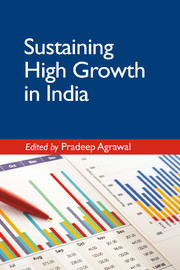Book contents
- Frontmatter
- Contents
- List of Tables
- List of Graphs and Maps
- Preface
- Introduction
- Section 1 Ensuring Macroeconomic Stability for Sustaining High Growth Rates
- 1 Propagation Mechanisms of Inflation in India: An Empirical Investigation
- 2 Managing Food Price Inflation in India: Demand Projections and Supply Considerations
- Section 2 Promoting Industrial Development for Sustaining High Growth Rates
- Section 3 The International Economic Issues and Sustaining High Growth
- Section 4 Infrastructure Bottlenecks to Sustaining High Growth
- Section 5 Some Socio-political Issues in Sustaining High Growth
- List of Contributors
- Obituary
- Index
2 - Managing Food Price Inflation in India: Demand Projections and Supply Considerations
from Section 1 - Ensuring Macroeconomic Stability for Sustaining High Growth Rates
Published online by Cambridge University Press: 08 February 2018
- Frontmatter
- Contents
- List of Tables
- List of Graphs and Maps
- Preface
- Introduction
- Section 1 Ensuring Macroeconomic Stability for Sustaining High Growth Rates
- 1 Propagation Mechanisms of Inflation in India: An Empirical Investigation
- 2 Managing Food Price Inflation in India: Demand Projections and Supply Considerations
- Section 2 Promoting Industrial Development for Sustaining High Growth Rates
- Section 3 The International Economic Issues and Sustaining High Growth
- Section 4 Infrastructure Bottlenecks to Sustaining High Growth
- Section 5 Some Socio-political Issues in Sustaining High Growth
- List of Contributors
- Obituary
- Index
Summary
INTRODUCTION
Over the last several years, food price inflation has become a major problem in India. Price stability is crucial for sustainable growth as persistent inflation implies higher demand in relation to supply. Thus, there is an urgent need to understand this problem and to respond with appropriate agricultural policies to keep food prices stable if we are to reduce hunger and poverty in India. One reason for the rising food prices could be increasing demand for food, as the income levels increase with rapid economic growth. Another reason could be supply and distribution problems. Increases in international prices of foods could also be a factor. However, in India, import of cereals particularly is too low, hence food inflation is likely driven by domestic factors.
Given this situation, this study aims to undertake a careful analysis of demand and supply of food in India. We first estimate the demand for various food categories such as cereals, pulses, fruits, vegetables, milk and milk products, meat, etc., for more precise and category-wise estimates. We then project the future demand for various food categories for the next 15 years up to 2030. Such projections could be helpful in understanding the likely forthcoming food consumption patterns in the country. Finally, we examine whether the available land resources in the country would be sufficient to meet the future food demand by investigating supply factors like total agricultural land area, yield per hectare and cultivation of various food categories. From the projected demand and supply considerations, the study also explores whether the projected future demand could be met with suitable re-allocation of agricultural land among various food categories and what other policies could be helpful in meeting the future demand. These considerations yield significant insights for formulating the appropriate future agriculture sector policies for the country.
This chapter is organized as follows:
• Section 2.2 provides a brief review of the food consumption pattern in India and compares it with the other emerging and developed countries at various levels of Gross Domestic Product (GDP) per capita.
• Section 2.3 develops a model for the demand for various food categories, discusses the sources of data and econometric methodology used. It then discusses the main empirical results of the demand estimations for the different food categories.
- Type
- Chapter
- Information
- Sustaining High Growth in India , pp. 55 - 84Publisher: Cambridge University PressPrint publication year: 2017

